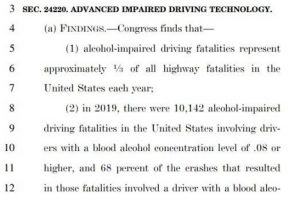
There has been a lot of discussion both before and after the passage of President Biden’s Infrastructure Bill, but there has been little emphasis on the effect it will have on DUI/DWI/OWI cases. In particular, the “Advanced Impaired Driving Technology” portion of the new law (Section 24220) directs automakers to install new technology designed to stop drivers from being able to start or continue to operate the vehicle if it detects they are impaired by alcohol.
According to the legislation, in the next three years the Secretary of Transportation must implement a final rule on exactly how new cars will passively monitor drivers for intoxication. Automakers will then have two more years to comply. Accordingly, all new cars sold in the U.S. should have this new technology no later than 2026, barring any granted extensions of time.
The new technology may consist of existing breath-testing devices to be built-in to the vehicles, and sensors in the steering wheel that detect alcohol (and other drugs?) through the driver’s perspiration on their hands. Of course, that doesn’t prevent accidents caused by sleep-deprived drivers, distracted drivers, or drivers under the influence of less common drugs. On the horizon of becoming mainstream technology, though, are eye detection trackers (cameras) to perceive fatigued or distracted drivers, and of course the advancement of self-driving vehicles.
Nevertheless, it will take decades before older vehicles will be phased-out and new (and ever-changing) technology can effectively prevent motor vehicle crashes regardless of the cause—but it is likely coming! This legislation is a good start to eliminating the problem of drunk driving—if the technology works and doesn’t create false positives.
False positives (indicating a sober driver is under the influence of an intoxicant) would create huge inconveniences for sober drivers and would perhaps be reported to law enforcement officials, creating significant problems for innocent people. We must all be vigilant to ensure such issues do not become commonplace.
About the Author: Steven Oberman has been licensed in Tennessee since 1980, and successfully defended over 2,500 DUI defendants. Among the many honors bestowed upon him, Steve has served as Dean of the National College for DUI Defense, Inc. (NCDD) and currently serves as chair of the National Association of Criminal Defense Lawyers DUI Committee. Steve was the first lawyer in Tennessee to be Board Certified as a DUI Defense Specialist by the NCDD.
He is the author of DUI: The Crime & Consequences in Tennessee, updated annually since 1991 (Thomson-West), and co-author with Lawrence Taylor of the national treatise, Drunk Driving Defense, 9th edition (Wolters Kluwer/Aspen). Steve has served as an adjunct professor at the University of Tennessee Law School since 1993 and has received a number of prestigious awards for his faculty contributions. He is a popular international speaker, having spoken at legal seminars in 30 states, the District of Columbia and six foreign countries. After being named a Fulbright Scholar, Steve was honored to teach as an Adjunct Professor at the University of Latvia Law School in the capital city of Riga, Latvia during the Spring Semester of 2019. If you would like to contact the author, please visit his website at www.tndui.com.